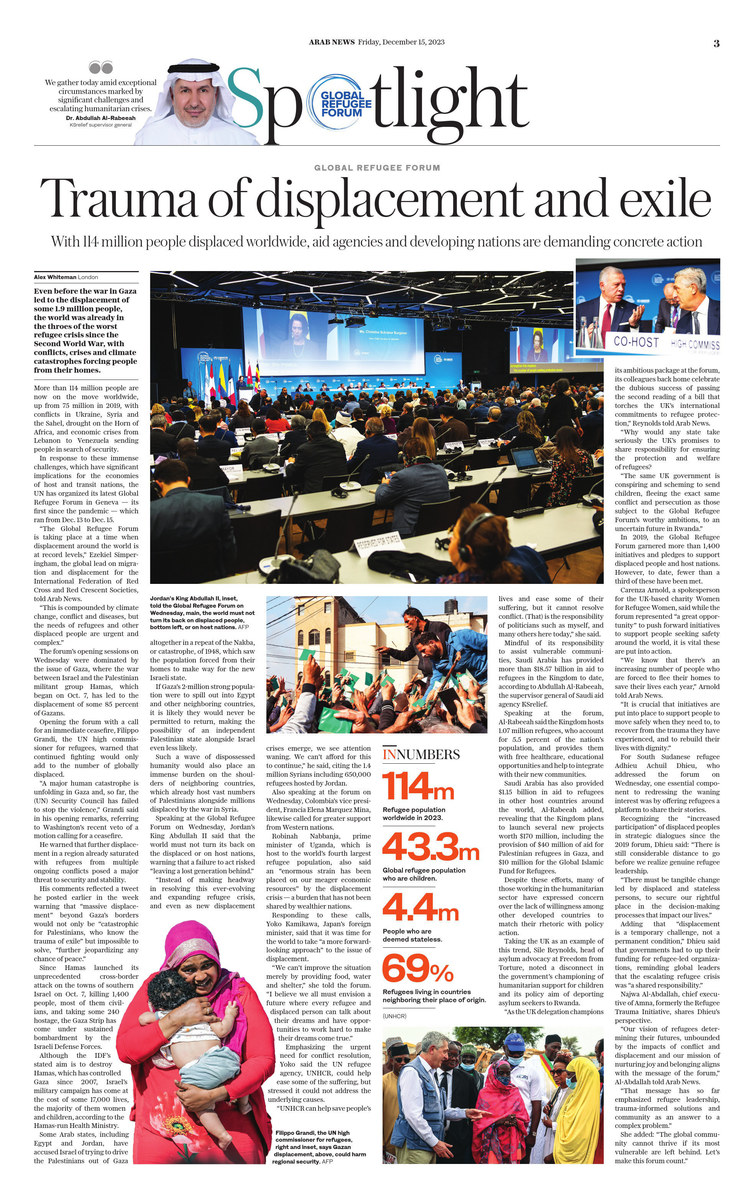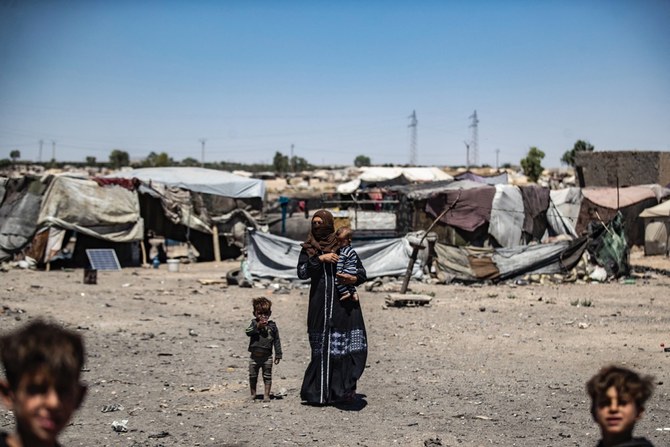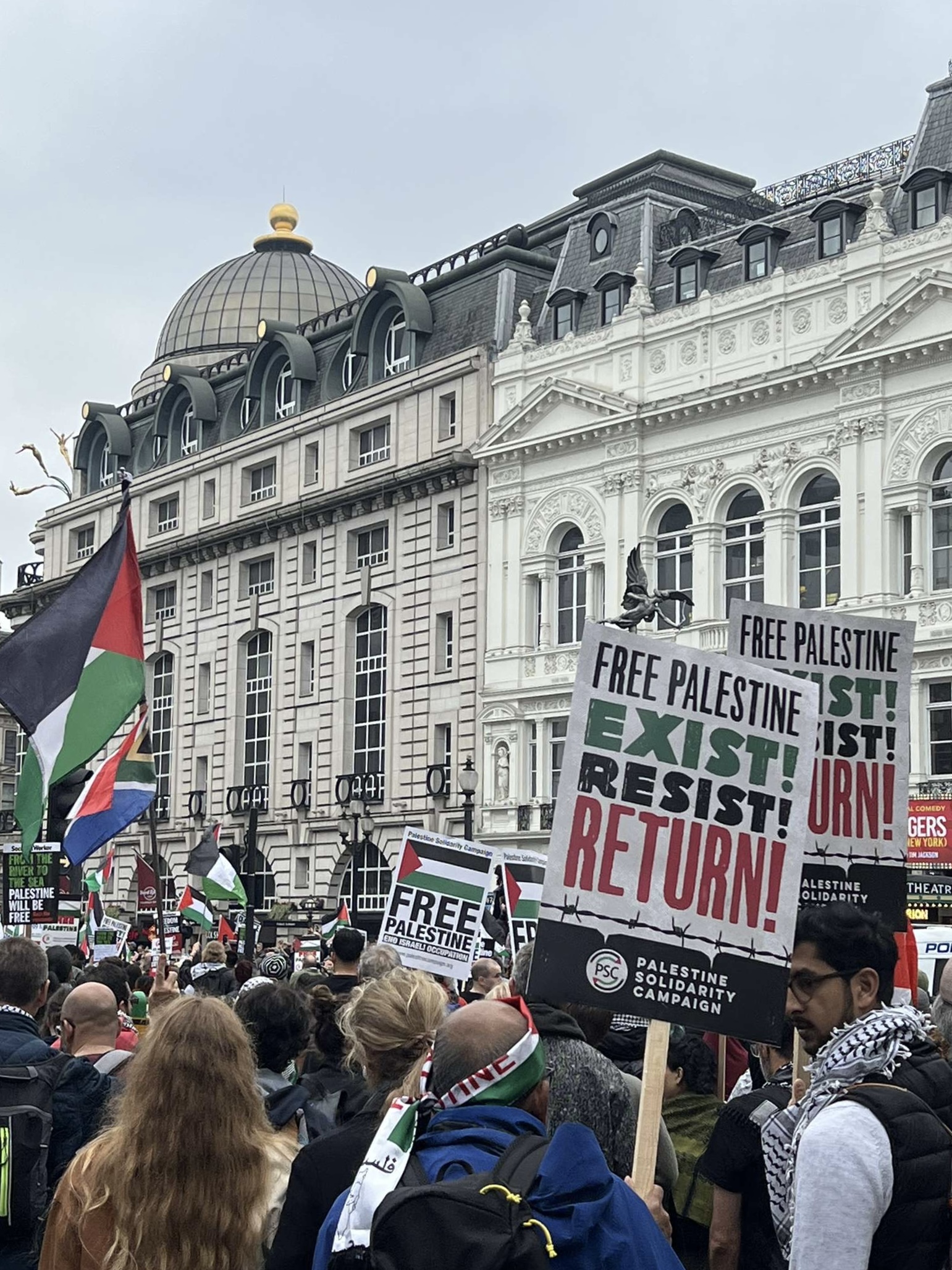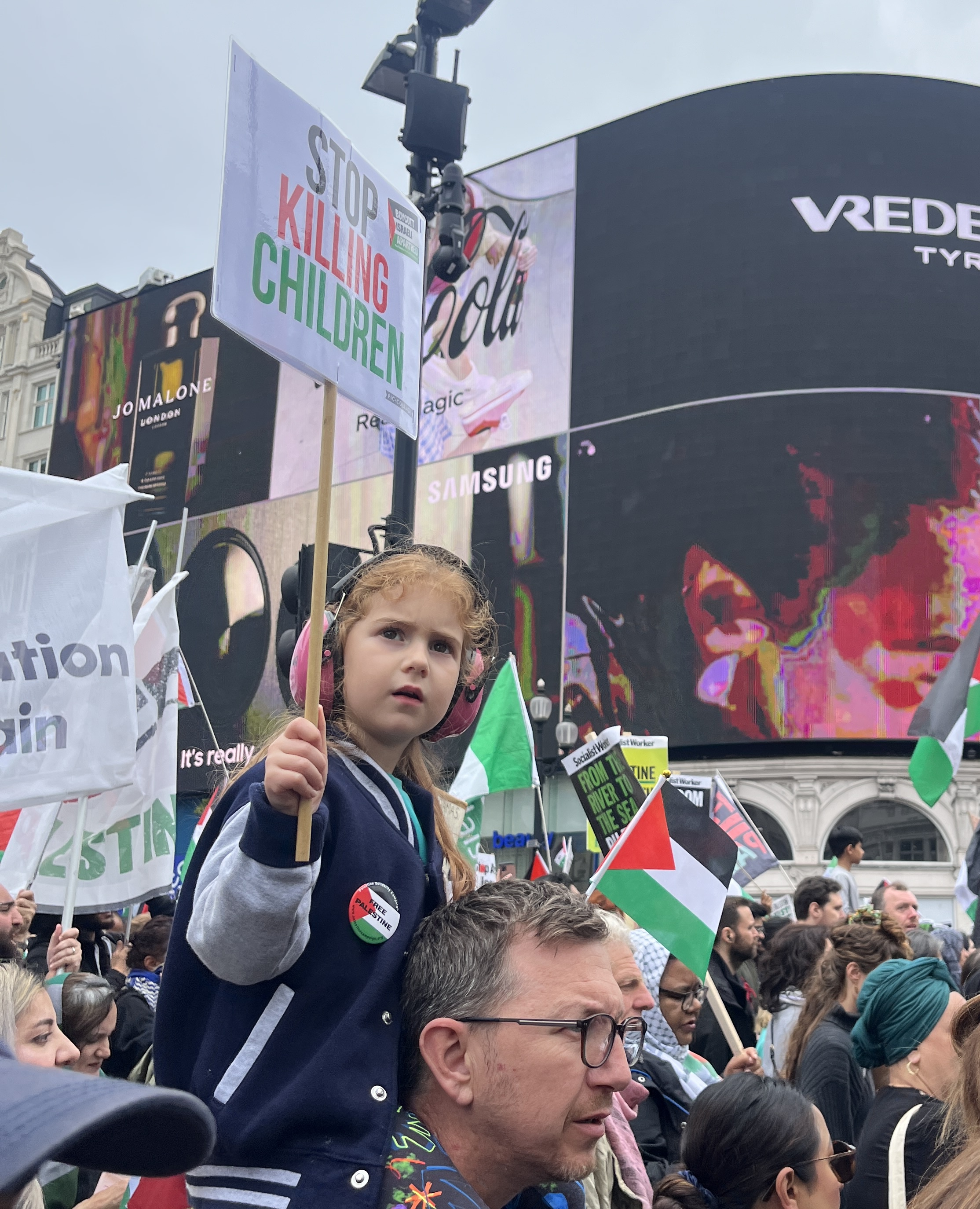LONDON: Even before the war in Gaza led to the displacement of some 1.9 million people, the world was already in the throes of the worst refugee crisis since the Second World War, with conflicts, crises and climate catastrophes forcing people from their homes.
More than 114 million people are now on the move worldwide, up from 75 million in 2019, with conflicts in Ukraine, Syria and the Sahel, drought on the Horn of Africa, and economic crises from Lebanon to Venezuela sending people in search of security.
In response to these immense challenges, which have significant implications for the economies of host and transit nations, the UN has organized its latest Global Refugee Forum in Geneva — its first since the pandemic — which ran from Dec. 13 to Dec. 15.
“The Global Refugee Forum is taking place at a time when displacement around the world is at record levels,” Ezekiel Simperingham, the global lead on migration and displacement for the International Federation of Red Cross and Red Crescent Societies, told Arab News.
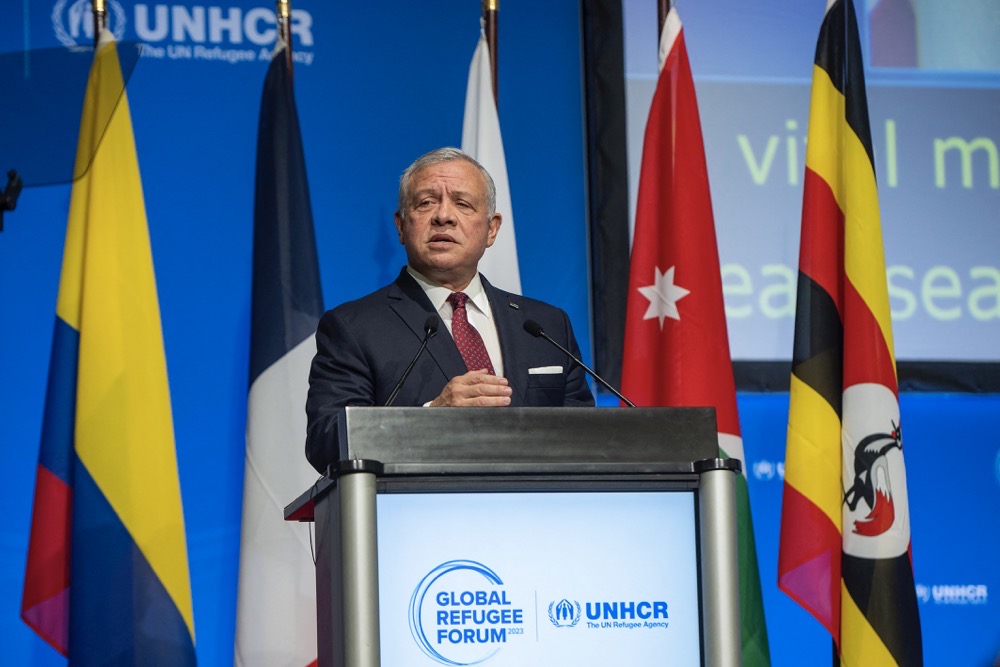
King Abdullah II of Jordan delivers a speech during the Global Refugee Forum, in Geneva on December 13, 2023. (AFP)
“This is compounded by climate change, conflict and diseases, but the needs of refugees and other displaced people are urgent and complex.”
The forum’s opening sessions on Wednesday were dominated by the issue of Gaza, where the war between Israel and the Palestinian militant group Hamas, which began on Oct. 7, has led to the displacement of some 85 percent of Gazans.
Opening the forum with a call for an immediate ceasefire, Filippo Grandi, the UN high commissioner for refugees, warned that continued fighting would only add to the number of globally displaced.
“A major human catastrophe is unfolding in Gaza and, so far, the (UN) Security Council has failed to stop the violence,” Grandi said in his opening remarks, referring to Washington’s recent veto of a motion calling for a ceasefire.
He warned that further displacement in a region already saturated with refugees from multiple ongoing conflicts posed a major threat to security and stability.
His comments reflected a tweet he posted earlier in the week warning that “massive displacement” beyond Gaza’s borders would not only be “catastrophic for Palestinians, who know the trauma of exile” but impossible to solve, “further jeopardizing any chance of peace.”
Since Hamas launched its unprecedented cross-border attack on the towns of southern Israel on Oct. 7, killing 1,400 people, most of them civilians, and taking some 240 hostage, the Gaza Strip has come under sustained bombardment by the Israeli Defense Forces.
Although the IDF’s stated aim is to destroy Hamas, which has controlled Gaza since 2007, Israel’s military campaign has come at the cost of some 17,000 lives, the majority of them women and children, according to the Hamas-run health ministry.
Some Arab states, including Egypt and Jordan, have accused Israel of trying to drive the Palestinians out of Gaza altogether in a repeat of the Nakba, or catastrophe, of 1948, which saw the population forced from their homes to make way for the new Israeli state.

More than 114 million people are now on the move worldwide. (AFP)
If Gaza’s two-million strong population were to spill out into Egypt and other neighboring countries, it is likely they would never be permitted to return, making the possibility of an independent Palestinian state alongside Israel even less likely.
Such a wave of dispossessed humanity would also place an immense burden on the shoulders of neighboring countries, which already host vast numbers of Palestinians alongside millions displaced by the war in Syria.
Speaking at the Global Refugee Forum on Wednesday, Jordan’s King Abdullah II said that the world must not turn its back on the displaced or on host nations, warning that a failure to act risked “leaving a lost generation behind.”
“Instead of making headway in resolving this ever-evolving and expanding refugee crisis, and even as new displacement crises emerge, we see attention waning. We can’t afford for this to continue,” he said, citing the 1.4 million Syrians including 650,000 refugees hosted by Jordan.
Abdullah pointed to what he called a model of “fluctuating support” from governments in Europe and the wider Western world, where refugees have at times been welcomed, as in the case of Ukrainians, and at other times refused entry.
Opinion
This section contains relevant reference points, placed in (Opinion field)
Also speaking at the forum on Wednesday, Colombia’s vice president, Francia Elena Marquez Mina, likewise called for greater support from Western nations. Her country, which sits at the crossroads between South and Central America, has played host to millions of Venezuelans and other nationalities escaping hardship and persecution.
Robinah Nabbanja, prime minister of Uganda, which is host to the world’s fourth largest refugee population, also said an “enormous strain has been placed on our meager economic resources” by the displacement crisis — a burden that has not been shared by wealthier nations.
Responding to these calls, Yoko Kamikawa, Japan’s foreign minister, said that it was time for the world to take “a more forward-looking approach” to the issue of displacement.
“We can’t improve the situation merely by providing food, water and shelter,” she told the forum. “I believe we all must envision a future where every refugee and displaced person can talk about their dreams and have opportunities to work hard to make their dreams come true.”
Emphasizing the urgent need for conflict resolution, Yoko said the UN refugee agency, UNHCR, could help ease some of the suffering, but stressed it could not address the underlying causes.
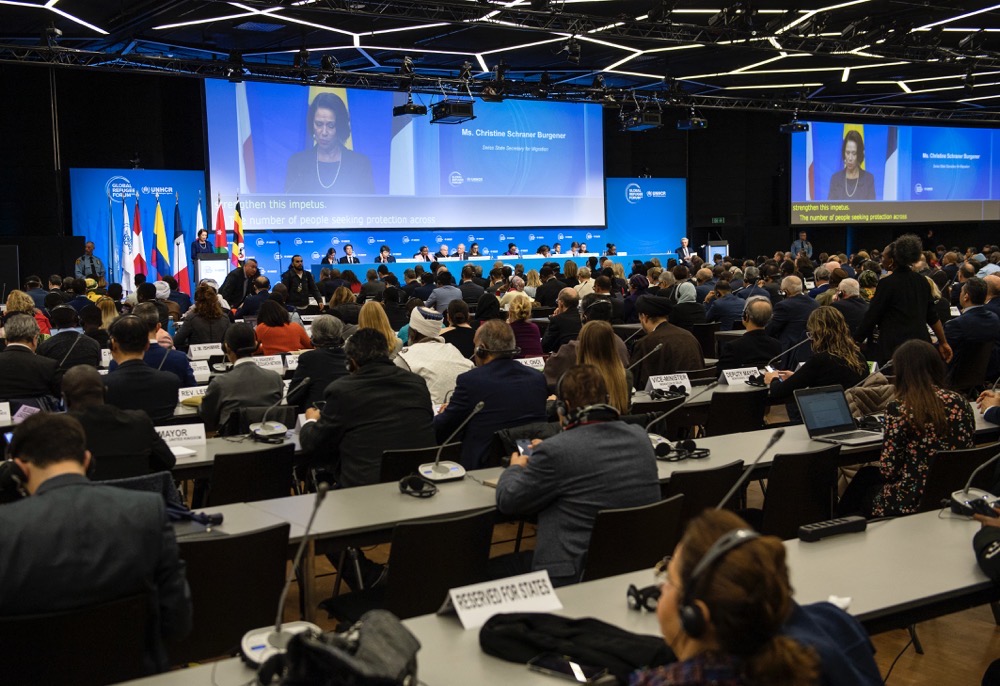
The UN has organized its latest Global Refugee Forum in Geneva which ran from Dec. 13 to Dec. 15. (AFP)
“UNHCR can help save people’s lives and ease some of their suffering, but it cannot resolve conflict. (That) is the responsibility of politicians such as myself, and many others here today,” she said.
Mindful of its responsibility to assist vulnerable communities, Saudi Arabia has provided more than $18.57 billion in aid to refugees in the Kingdom to date, according to Abdullah Al-Rabeeah, the supervisor general of Saudi aid agency KSrelief.
Speaking at the forum, Al-Rabeeah said the Kingdom hosts 1.07 million refugees, who account for 5.5 percent of the nation’s population, and provides them with free health care, educational opportunities and help to integrate with their new communities.
Saudi Arabia has also provided $1.15 billion in aid to refugees in other host countries around the world, Al-Rabeeah added, revealing that the Kingdom plans to launch several new projects worth $170 million, including the provision of $40 million of aid for Palestinian refugees in Gaza, and $10 million for the Global Islamic Fund for Refugees.
Despite these efforts, many of those working in the humanitarian sector have expressed concern over the lack of willingness among other developed countries to match their rhetoric with policy action.
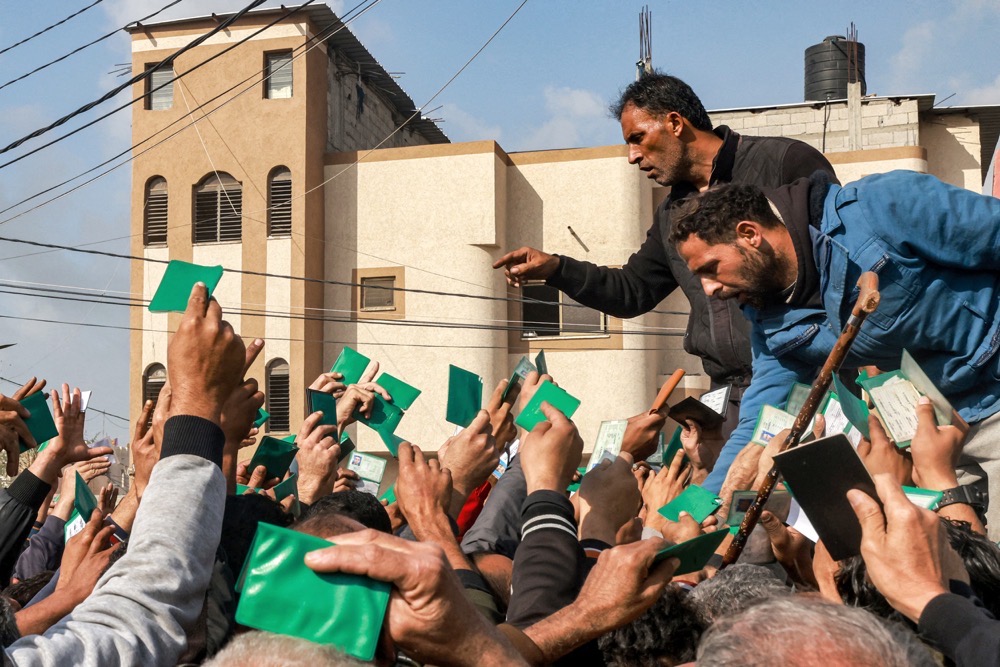
Palestinians wave their identity cards as they gather to receive flour rations for their families outside a UNRWA warehouse in Rafah. (AFP)
Taking the UK as an example of this trend, Sile Reynolds, head of asylum advocacy at Freedom from Torture, noted a disconnect in the government’s championing of humanitarian support for children and its policy aim of deporting asylum seekers to Rwanda.
“As the UK delegation champions its ambitious package at the forum, its colleagues back home celebrate the dubious success of passing the second reading of a bill that torches the UK’s international commitments to refugee protection,” Reynolds told Arab News.
“Why would any state take seriously the UK’s promises to share responsibility for ensuring the protection and welfare of refugees?
“The same UK government is conspiring and scheming to send children, fleeing the exact same conflict and persecution as those subject to the Global Refugee Forum’s worthy ambitions, to an uncertain future in Rwanda.”
In 2019, the Global Refugee Forum garnered more than 1,400 initiatives and pledges to support displaced people and host nations. However, to date, fewer than a third of these have been met.
Carenza Arnold, a spokesperson for the UK-based charity Women for Refugee Women, said while the forum represented “a great opportunity” to push forward initiatives to support people seeking safety around the world, it is vital these are put into action.
INNUMBERS
• 114m Refugee population worldwide in 2023.
• 43.3m Global refugee population who are children.
• 4.4m People who are deemed stateless.
• 69 percent Refugees living in countries neighboring their place of origin.
(UNHCR)
“We know that there’s an increasing number of people who are forced to flee their homes to save their lives each year,” Arnold told Arab News.
“It is crucial that initiatives are put into place to support people to move safely when they need to, to recover from the trauma they have experienced, and to rebuild their lives with dignity.”
For South Sudanese refugee Adhieu Achuil Dhieu, who addressed the forum on Wednesday, one essential component to redressing the waning interest was by offering refugees a platform to share their stories.
Recognizing the “increased participation” of displaced peoples in strategic dialogues since the 2019 forum, Dhieu said: “There is still considerable distance to go before we realize genuine refugee leadership.
“There must be tangible change led by displaced and stateless persons, to secure our rightful place in the decision-making processes that impact our lives.”
Adding that “displacement is a temporary challenge, not a permanent condition,” Dhieu said that governments had to up their funding for refugee-led organizations, reminding global leaders that the escalating refugee crisis was “a shared responsibility.”
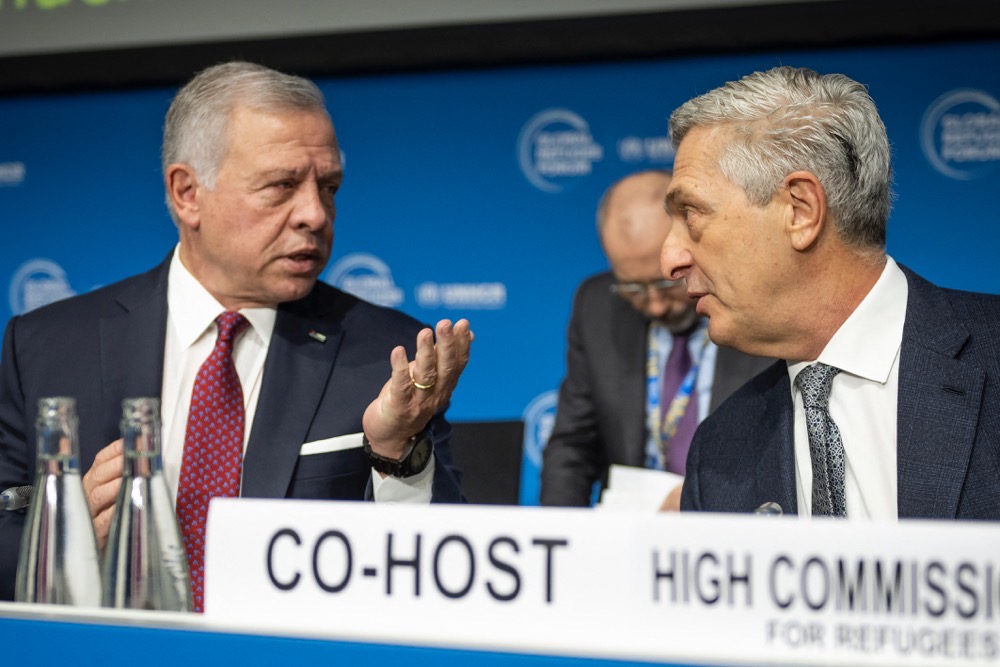
King Abdullah II of Jordan (L) speaks with UN High Commissioner for Refugees Filippo Grandi (R) during the Global Refugee Forum, in Geneva. (AFP)
Najwa Al-Abdallah, chief executive of Amna, formerly the Refugee Trauma Initiative, shares Dhieu’s perspective.
“Our vision of refugees determining their futures, unbounded by the impacts of conflict and displacement and our mission of nurturing joy and belonging aligns with the message of the forum,” Al-Abdallah told Arab News.
“That message has so far emphasized refugee leadership, trauma informed solutions and community as an answer to a complex problem.”
She added: “The global community cannot thrive if its most vulnerable are left behind. Let’s make this forum count.”
